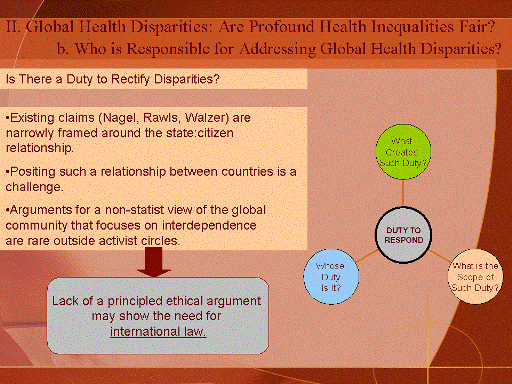Search for most updated materials ↑
| front |1 |2 |3 |4 |5 |6 |7 |8 |9 |10 |11 |12 |13 |14 |15 |16 |17 |18 |19 |20 |21 |22 |23 |24 |25 |26 |27 |28 |review |
 |
Does a duty exist to
rectify these disparities?
Not everyone accepts the
claim that health has a special value because it is necessary for
human functioning, agency, and opportunity. But even if this theory
were sufficient, it would still not answer the harder question about
the corresponding obligation to do something about global
inequalities. First and foremost, what creates such a duty? Whose
duty is it? And what is the scope of that duty, if there is one?
Even liberal egalitarians
who believe in just distribution, such as Nagel, Rawls, and Walzer,
frame their claims narrowly and rarely extend them to international
obligations of justice. Their theories of justice are “relational”
and apply to a fundamental social structure that people share.
States may owe their citizens basic health protection by reason of a
social compact. But positing such a relationship among different
countries and regions is much more difficult. Those arguing for a
non-statist view of health obligations might point to an
increasingly interdependent world—social, political, and economic.
They see a global community that sets norms regarding world health,
and a network of international organizations and rule making. But,
whether this international order requires fair terms of cooperation,
let alone wealth transfer to poorer States, is far from well
accepted outside activist circles.
Perhaps there is no
principled ethical argument because it is so hard to craft. A way
forward might be to use international law, so that States can accede
to a set of shared responsibilities, with a fuller understanding of
what they are agreeing to, and why. I will propose a FCGH later in
this Lecture, but before doing so it is necessary to explain more
precisely the kind of obligation that I think is necessary to
enshrine in a Framework Convention.
|